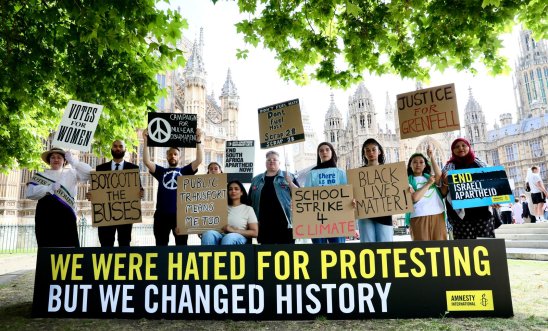
Press releases
UK: Crime and policing bill an attack on our 'proud legacy of protest'

Amnesty International stages powerful ‘human timeline’ highlighting over 100 years of protest
From suffragettes to Bristol Boycott: a legacy of defiant movements
The Crime and Policing Bill seeks to further erode right to protest
Amnesty International has organised a ‘human timeline’ outside Parliament to highlight Britain’s ‘proud history of defiant movements’, ahead of the Report stage debate on the Crime and Policing Bill on the 17th June. It is the fourth anti-protest bill introduced in Parliament in just four years.
The proposed legislation would give police sweeping new powers, including the ability to ban face coverings at protests, impose restrictions on protests based on vague rules around being in the ‘vicinity’ of religious buildings, and compel people, including protesters, on limited visas to leave the country if they receive a police caution.
The bill follows last year’s Criminal Justice Bill, part of the former government's sustained crackdown on peaceful protest. Protesters now face increasing criminalisation, with some receiving prison sentences for nonviolent action that exceed those given for serious violent crimes.
The protest outside Parliament today features real-life activists and actors representing key historical movements and holding placards:
-
The Suffragettes
“They told us to stay at home, but we won women the right to vote”
-
The Anti-Apartheid protests
“They called us ‘terrorists’ but we helped bring about a fairer society”
-
The Campaign for Nuclear Disarmament
“They called us naive, but we advocated for a safer world”
-
The Bristol Bus Boycott
“They called us ‘irresponsible’, but we helped to make racial discrimination in employment unlawful”
-
The Abolish Section 28 Marches
“They called us “deviants”, but we won equal rights and respect”
-
The disability rights protests that led to the Disability Discrimination Act
“They called us annoying but we tackled discrimination against people with disabilities”
-
The Justice for Grenfell solidarity marches
“They called us powerless, but we continue to expose the injustice of housing in the UK”
-
Youth Strike for Climate
“They called us eco-mobs, but we made it impossible to ignore the plight of our planet”
-
Black Lives Matter
“They called us ‘thugs’ but we continue to uncover institutional racism”
-
The pro-Palestinian protests responding to the war in Gaza
“They call us hate marches, but we won’t stop campaigning against apartheid and genocide”
By demonstrating the breadth of protest over the past 100 years, and the rights and freedoms that were won, the stunt shows their true power in making the world a better, more equitable place.
Kerry Moscogiuri, Amnesty International UK’s Director of Campaigns, said:
“The UK has a legacy of defiant movements – where demonstrations both large and small, have shaped a fairer and more just society.
“From the Suffragettes and the Anti-Apartheid Movement to the Bristol Bus Boycott or the UK’s first Pride march, these protesters faced fierce resistance in their time. Yet today, we celebrate the rights and freedoms they fought so hard to win.
“The new Crime and Policing Bill is the fourth piece of legislation in as many years aimed at clamping down on our right to protest. It’s yet another example of the Government attacking our ability to hold them to account beyond the ballot box – undermining our freedom of speech. Had such laws existed in the past, many of the historic protests we now celebrate might not have been possible.
"We have a proud history of protest and we must continue on that path, not follow the tide of authoritarian laws that’s undermining freedom globally.”
A spokesperson for Grenfell United, said:
"The power of protest should never be forgotten. Our Silent walks serve both to remember those we lost, and to show that Grenfell issues are not localised, they are a national problem. Building safety affects thousands of people across the country, whether leaseholder, private or social housing tenant, and our gatherings show those responsible the pace of change is too slow, and the risk to life too high.
"The Crime and Policing Bill is part of a growing trend on the crackdown of the right to protest. This is a deeply concerning trend for communities who turn to protest as a result of the grave injustices they have faced. By walking in our thousands each year, we show those in power we will never forget what was done to us, what needs to happen, and that the nation is behind us in our fight for Justice”